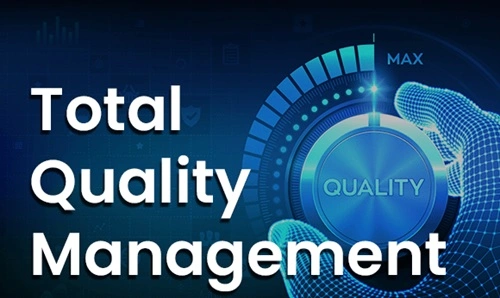Total Quality Management (TQM) is a strategic management approach focused on continuous improvement in products, services, and processes by enhancing efficiency, reducing errors, and improving customer satisfaction. It involves integrating quality principles across all departments of an organization, ensuring long-term business success.
TQM is widely used in industries such as manufacturing, healthcare, IT, banking, and hospitality to improve operational efficiency. Leading Indian companies like Tata Steel, Infosys, Maruti Suzuki, and Wipro implement TQM to maintain high standards of quality, enhance competitiveness, and reduce wastage.
While TQM enhances organizational efficiency and customer loyalty, it also requires significant investment, employee training, and a long-term commitment to process improvement.
In this article, we explore the advantages and disadvantages of Total Quality Management (TQM) to help businesses understand its impact on operations, profitability, and growth.
Quick Overview: Advantages & Disadvantages of TQM

| Advantages | Disadvantages |
|---|---|
| Improves Product & Service Quality | High Implementation Costs & Resource Requirements |
| Enhances Customer Satisfaction & Loyalty | Time-Consuming & Requires Long-Term Commitment |
| Reduces Wastage & Enhances Operational Efficiency | Resistance to Change Among Employees |
| Boosts Employee Morale & Engagement | Complexity in Implementation & Process Standardization |
| Provides a Competitive Advantage in the Market | Requires Continuous Monitoring & Regular Audits |
| Ensures Compliance with Industry Standards & Regulations | Initial Productivity May Decline During Transition |
Advantages of Total Quality Management (TQM)
1. Improves Product & Service Quality
The primary goal of TQM is to enhance the quality of products and services by:
- Reducing defects and inconsistencies.
- Implementing quality control measures at every stage.
- Ensuring continuous improvement based on feedback.
For example, Maruti Suzuki follows TQM principles to maintain high vehicle quality, reduce recalls, and enhance customer trust.
2. Enhances Customer Satisfaction & Loyalty
TQM focuses on meeting and exceeding customer expectations, leading to:
- Higher customer retention and brand loyalty.
- Fewer product complaints and returns.
- Positive brand reputation and word-of-mouth marketing.
For instance, Infosys applies TQM in software development, ensuring high-quality IT solutions and customer satisfaction.
3. Reduces Wastage & Enhances Operational Efficiency
TQM emphasizes lean manufacturing and efficient resource utilization, reducing:
- Production delays and defects.
- Material wastage and rework costs.
- Inefficiencies in supply chain management.
For example, Toyota’s Lean Manufacturing System minimizes waste and improves production efficiency using TQM principles.
4. Boosts Employee Morale & Engagement
TQM encourages employee involvement and teamwork, leading to:
- Higher motivation and job satisfaction.
- Better communication across departments.
- A culture of continuous learning and innovation.
For instance, Tata Steel empowers employees through training programs and quality circles, improving productivity and job satisfaction.
5. Provides a Competitive Advantage in the Market
Companies implementing TQM can:
- Differentiate themselves from competitors.
- Attract new customers through superior quality.
- Increase market share and profitability.
For example, Apple’s focus on quality and innovation has made it a market leader in consumer electronics.
6. Ensures Compliance with Industry Standards & Regulations
TQM helps organizations:
- Meet ISO quality standards and regulatory requirements.
- Improve compliance with safety and environmental laws.
- Reduce legal risks and penalties.
For example, pharmaceutical companies like Sun Pharma implement TQM to comply with FDA and WHO quality regulations.
Disadvantages of Total Quality Management (TQM)
1. High Implementation Costs & Resource Requirements
Implementing TQM requires:
- Investment in training, technology, and process redesign.
- Hiring quality control experts and auditors.
- Developing standardized workflows and documentation.
For example, a small business may struggle with the costs of implementing TQM compared to a large corporation.
2. Time-Consuming & Requires Long-Term Commitment
TQM is a continuous improvement process that requires:
- Years of dedication to achieve measurable results.
- Constant monitoring and refinements.
- Patience and commitment from management and employees.
For instance, a manufacturing company adopting TQM may not see significant improvements in efficiency for the first few years.
3. Resistance to Change Among Employees
Employees often resist TQM due to:
- Fear of job restructuring or increased workload.
- Lack of understanding of new processes.
- Unwillingness to adopt new technologies and methodologies.
For example, introducing TQM in a traditional organization may require extensive change management strategies.
4. Complexity in Implementation & Process Standardization
TQM requires organizations to:
- Redesign existing workflows.
- Implement uniform quality standards across all departments.
- Continuously track and analyze performance metrics.
For instance, multinational companies like Unilever face challenges in implementing TQM across diverse global operations.
5. Requires Continuous Monitoring & Regular Audits
TQM is not a one-time process; it requires:
- Frequent quality audits and performance evaluations.
- Data collection and analysis for continuous improvement.
- Regular updates to policies and procedures.
For example, airline companies like IndiGo must constantly audit their operations to maintain high safety and service standards.
6. Initial Productivity May Decline During Transition
During the initial phase of TQM implementation, organizations may experience:
- Temporary declines in productivity due to process changes.
- Increased training time for employees.
- Short-term resistance and inefficiencies.
For instance, a company shifting to TQM may face operational slowdowns as employees adapt to new quality control measures.
Who Should Implement Total Quality Management (TQM)?
Best Suited For:
✔ Large organizations seeking long-term quality improvement and cost reduction.
✔ Manufacturing companies aiming for lean production and waste minimization.
✔ Service industries (IT, healthcare, hospitality) requiring customer satisfaction and process optimization.
✔ Businesses looking to comply with international quality standards (ISO, Six Sigma, etc.).
Not Suitable For:
✘ Small businesses with limited budgets and resources for implementation.
✘ Companies needing immediate short-term improvements rather than long-term strategies.
✘ Organizations with resistance to change or lack of leadership commitment.
Conclusion: Is Total Quality Management (TQM) a Good Business Strategy?
Total Quality Management (TQM) is a powerful strategy that helps businesses enhance product quality, improve operational efficiency, and increase customer satisfaction. However, it requires long-term investment, employee commitment, and continuous monitoring to deliver sustainable results.
For companies aiming for continuous improvement and competitive advantage, TQM is a valuable approach. However, businesses must ensure proper planning, leadership support, and employee training to maximize its benefits.
Anantha Nageswaran is the chief editor and writer at TheBusinessBlaze.com. He specialises in business, finance, insurance, loan investment topics. With a strong background in business-finance and a passion for demystifying complex concepts, Anantha brings a unique perspective to his writing.


